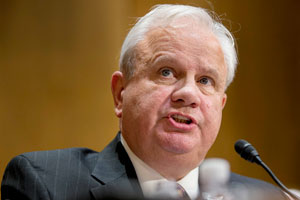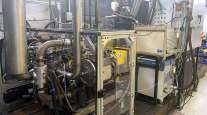Natural Gas Proponents Outline Challenges for Senate

Trucking and natural-gas industry witnesses told a Senate panel Dec. 3 that Congress could spur the use of the alternative fuel in the transportation sector by changing the tax code, subsidizing a fueling network and addressing existing weight restrictions on highways.
Eliminating the disparity between the way the federal government taxes diesel and liquefied natural gas, and reducing the excise tax for new natural-gas trucks also would accelerate the transition to natural gas, which produces fewer greenhouse gas emissions and is a domestic product unaffected by the global fuel market, the witnesses said.
“The lack of a national network of natural-gas stations is the leading obstacle facing natural-gas longhaul trucking,” said Robert Carrick, sales manager-natural gas for Daimler Trucks North America.
“The incremental cost of a typical natural-gas truck is $45,000 to $60,000 [plus a 12% federal excise tax on all new truck sales] more expensive than a comparable truck with a conventional diesel engine,” Carrick said at the hearing held by the Senate Finance Committee’s Subcommittee On Energy, Natural Resources and Infrastructure.
Carrick also said the manufacturer received a record number of orders this year for natural-gas trucks, though he did not specify a number.
Mike Whitlatch, senior director of global energy and procurement for UPS, testified that the tax disparity between LNG and diesel is a “bigger impediment” to buying LNG-powered trucks than the price differential.
The federal tax on diesel and LNG is 24.4 cents a gallon, but “a gallon of LNG produces only 58% of the energy produced from a gallon of diesel,” Whitlatch said. That means LNG is effectively taxed at 170% of the rate of diesel fuel on an energy-equivalent basis, he said.
“The result is that the extra 17 cents per equivalent gallon for LNG adds up over the life of the truck to more than the extra initial cost of an LNG truck over a conventional diesel truck,” Whitlatch said.
Subcommittee Chairman Michael Bennet (D-Colo.) has introduced a bill that would eliminate the disparity, and there is a companion bill in the House, though Congress has not acted yet.
Bills also are pending in Congress to accommodate the heavier natural-gas fuel tanks. Most of the interstate system has an 80,000-pound weight limit, and natural-gas fuel tanks can add nearly 2,000 pounds to a truck.
Despite the tax inequity and other barriers, UPS has 1,243 heavy tractors operating on LNG and CNG, or compressed natural gas, on highways today, Whitlatch said.
“In fact, in 2014, the only new tractors that UPS is purchasing for its domestic, small package delivery business will run on natural gas,” he said.
Bennet called the information gleaned from the witnesses astounding.
“I think what’s clear . . . is there’s a revolution going on out there, the beginnings of one anyway, that American entrepreneurs are figuring out how to invent the future when it comes to driving our fleets,” he said.
“But there are some things that Congress can do to help along the way and create an ecosystem that actually gets us to a place where maybe we can get off refined petroleum imported from other places and onto our own cleaner burning natural gas.”
The hearing was held at the same time Congress is debating whether to renew a host of tax credits that have helped bolster the natural-gas industry but that expired at the end of 2013.
Those tax credits would go to those who build natural-gas fueling stations and to those who pump natural gas into trucks, whether they are fuel companies or carriers with their own natural-gas fueling stations.




